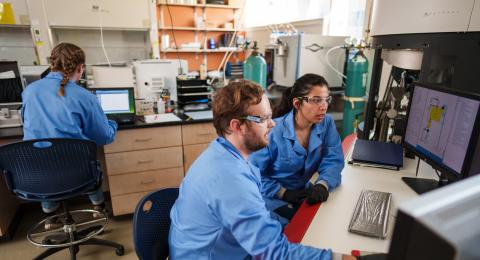Why get a Master of Engineering in Bioengineering?
Earning a master’s degree can be the key to unlocking your career potential or entering the world of entrepreneurship. In fact, earning an advanced degree can translate into more than $15,000 annually in salary compared to those with an undergraduate degree alone. UNH’s M.Eng in bioengineering will provide you with advanced training and experience in one of the many areas, including biochemical engineering, biomedical engineering, chemical and biosensors, biomaterials, tissue engineering. The master’s degree program concludes with an engineering project, often with an industrial sponsor.
Why choose UNH’s Bioengineering Program?
Our bioengineering program is leading the way thanks to state-of-the-art facilities, award-winning faculty members and cutting-edge research. Our professors have won National Science Foundation CAREER awards and NIH MIRA Outstanding Investigator grants. They are working to save lives and improve our quality of life through initiatives such as CIBBR (Center for Integrated Bioengineering and Biomedical Research), NH BioMade, the ARMI (Advanced Regenerative Manufacturing Institute), and BIO-SENS (Biologically-Inspired On-demand Strategies for Engineering Nanostructured Sensors). The department hosts a robust seminar series schedule to provide additional opportunities to learn and network within the field.
Potential Career Areas
- Biotechnology
- Medical Devices
- Biomedical Engineering
- Genetic Engineering
- Biomaterials Engineering
- Bioinstrumentation
- Regenerative Medicine
- Pharmaceuticals and medicine
- Synthetic biology
- Tissue engineering
Curriculum & Requirements
Earning a master’s degree can be the key to unlocking your career potential or entering the world of entrepreneurship. In fact, earning an advanced degree can translate into better career growth prospects and higher annual salaries of up to $15,000 compared to those with an undergraduate degree alone. The Bioengineering (BioE) graduate program at UNH provides you with advanced training and experience in one of the many areas, including computational bioengineering, biochemical and biomedical engineering, electrochemical methods, advanced materials, and microfluidics. The master’s degree program concludes with an engineering project which may be completed with an industrial sponsor.
Admission Requirements
An applicant to the Master of Engineering program will have completed a baccalaureate degree in engineering or a related field. Students with good undergraduate records in the science fields may be admitted provided they learn specific math and engineering skills that are aimed at successful completion of the Master of Engineering program requirements. Applicants must submit current scores (within five years) from the general test of the Graduate Record Examination. International students are required to submit TOEFL test scores. IELTS scores are accepted on a case-by-case basis, and students must have a minimum score of 6.5.
Degree Requirements
A minimum of 30 credits are required as follows:
| Code | Title | Credits |
|---|---|---|
| Required Courses | ||
| CHBE 900 | Seminar 1 | 1 |
| CHBE 860 | Principles of Bioengineering | 3 |
| Electives | ||
| Select two additional CHBE Courses 2 | 6-8 | |
| Select one Math/Data Science course 2 | 3-4 | |
| Select one Life Science course 2 | 3-5 | |
| Select additional Electives 2,3 | 8-13 | |
- 1
Students should register for CHBE 900 for 2 credits in their first two semesters and CHBE 900 for 0 credits each additional semester until their degree is granted.
- 2
Can be made up of electives offered by the CHBE department, the College of Engineering and Physical Sciences or the College of Life Sciences and Agriculture. In addition, courses taken within the UNH School of Law, College of Liberal Arts, and the Paul College of Business and Economics can apply with approval. Electives must be assessed with a letter grade and cannot be pass/fail. At least one of the electives must be at the 900-level. Students who do not register for CHBE 898 must take at least one elective course that requires completing a scholar report, paper, or essay.
- 3
The elective course credits may include CHBE 898 Master’s Project of up to 6 credits.
Program Learning Outcomes
- use appropriate bioengineering techniques, tools and methods to solve broadly defined engineering problems.
- demonstrate oral and written communication skills.
